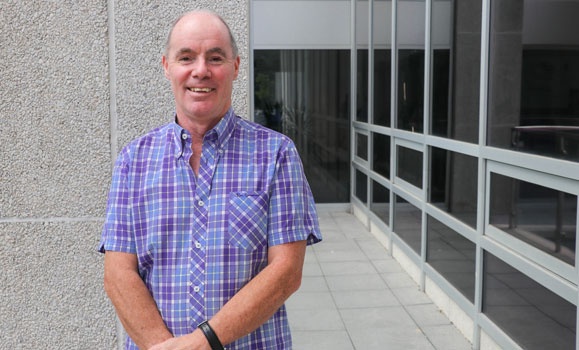Policy impact is an integral part of the fabric of the Schulich School of Law. Our work is grounded in shaping public policy through interdisciplinary, collaborative research that has a positive, real-world impact beyond the law school. Today, we’re looking at Professor Richard Devlin’s work in legal ethics, and how it’s helping to shape the regulation of legal professionals in Canada.
Every¬†individual and institution needs¬†to¬†be subject to¬†mechanisms of accountability. Judges are no different.¬†Professor Richard Devlin¬†examined¬†this¬†issue¬†as¬†co-editorŐż≤Ļ≤‘ĽŚ co-author¬†of¬†the 2017¬†book¬†Regulating Judges: Beyond Independence and Accountability, which¬†provides a framework that identifies multiple variables for the assessment of an effective and legitimate judiciary.¬†
‚ÄúAn important¬†way to¬†conduct¬†that assessment¬†is to consider different ways in which jurisdictions establish,¬†support,Őż≤Ļ≤‘ĽŚ regulate their judiciaries,‚ÄĚ says Devlin, whose¬†policy work has¬†mostly¬†focused on¬†the¬†regulation of¬†the legal profession and the judiciary.¬†His¬†research attempts to hold those who exercise power to standards of accountability, transparency, and equality.¬†‚ÄúA thriving and mature democracy requires openness and innovation,Őż≤Ļ≤‘ĽŚ academics hold the public trust to improve responsibleŐż≤Ļ≤‘ĽŚ responsive¬†governance.‚Ä̬†
In 2011, Devlin was the founding president of the Canadian Association of Legal Ethics/Association canadienne pour l’éthique juridique (CALE/ACEJ), where he currently chairs the board. Recently CALE/ACEJ has been making submissions to the Canadian Judicial Council on revisions to the Ethical Principles for Judges. One vital topic is whether this document should be given the status of an enforceable code of conduct or remain just a set of aspirational guidelines. 
As faculty, we have the privilege and benefit of academic freedom, and this imposes a responsibility on us to promote the public interest in the regulation of Canadian judges and lawyers.
Another particularly hot topic is the issue of judges returning to practice after retirement, which has been catapulted into the limelight by the SNC-Lavalin affair. The issue at play is that while at one level they are retired and they should be free to do as they wish, another is that they are using the credential of being a judge to maximize their own and their clients’ self-interest.
Devlin’s research extends deeply into the Canadian legal profession’s codes of conduct. As a member of the Nova Scotia Barristers’ Society’s Code of Ethics Committee, he contributed to the Federation of Law Societies of Canada’s Model Code of Professional Conduct, as well as Nova Scotia’s Code. 
ĪŠĺĪ≤űŐż∑…ī«įýįžŐż∑…ĺĪ≥Ŕ≥ů Professor Colin Jackson and Brent Cotter of the University of Saskatchewan‚Äôs College of Law on the duty¬†of loyalty has influenced the Conflicts of Interest¬†chapter of the NSBS‚ÄôsŐż≤Ļ≤‘ĽŚ the Federation of Law Societies of Canada‚Äôs Codes of Conduct.¬†He¬†has¬†also¬†collaborated with Professors Jocelyn¬†DownieŐż≤Ļ≤‘ĽŚ Sheila Wildeman on¬†successfully arguing for changes to be made to¬†the Duty to Report section of¬†the Codes of Conduct¬†to eliminate stigmatizing references to mental disability.
‚ÄúAs faculty, we¬†have the privilege and benefit of academic freedom, and this imposes¬†a responsibility¬†on us to promote the public interest in the regulation of Canadian judges and lawyers,‚ÄĚ says¬†Devlin.¬†‚ÄúYou fight the battles that you think you can win. There‚Äôs no predictability in progress, but¬†you have to¬†continue to engage with a sense of optimism.‚ÄĚ
Recent News
- Professor Emeritus Rollie Thompson ft in "N.S. child welfare system 'incredibly broken,' say experts after guilty plea in toddler death"
- H¬ĢĽ≠ Legal Aid Service Community Legal Worker Sydnee Blum ft in "5% Cap No Help For Low‚ÄĎIncome Renters"
- Assistant Professor Suzie Dunn ft in "Why it's taken so long to update the Criminal Code to include sexual deepfakes"
- Professor Emeritus Wayne MacKay ft in "This is Nova Scotia: The Furore Over Indigenous Cannabis Sales"
- Professor Emeritus Wayne MacKay ft in "Class‚ÄĎaction lawsuit against Nova Scotia Power important for accountability, says law prof"
- Professor Emeritus Wayne MacKay ft in "N.S. premier firm on cannabis crackdown as tensions grow with Mi’kmaq communities"
- Professor Emeritus Wayne MacKay ft in "N.S. premier responds to criticism from Mi’kmaq over cannabis crackdown"
- Associate Professor Andrew Flavelle Martin ft in "Immunity for Alberta attorney general necessary to ward off ‚Äėpolitical activism,‚Äô attorney general says"

